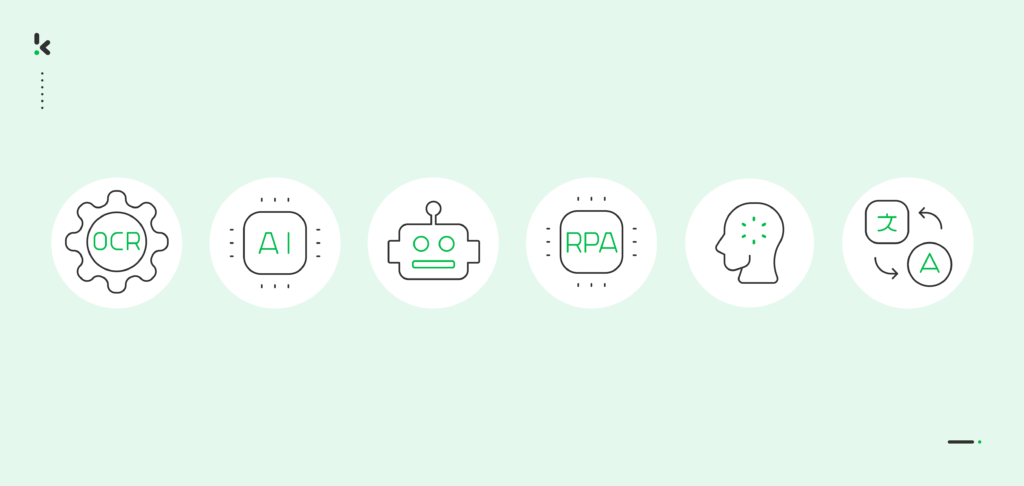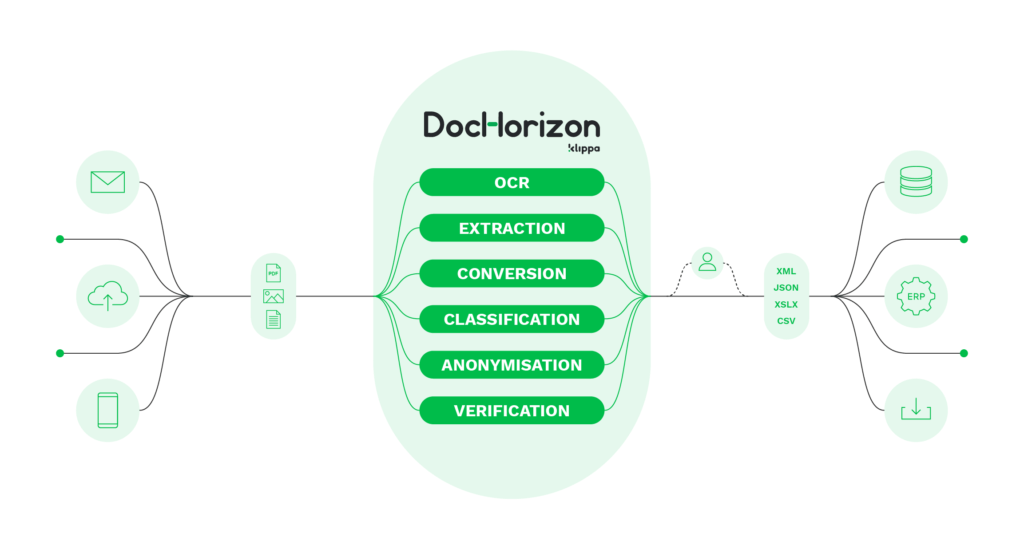

Navigating through buzzwords like AI, RPA, BPA, and Intelligent Automation can be overwhelming. If you’re a business owner or an executive, you’ve very likely heard about some of them, but you may not fully understand what the differences are and what they mean for your organization.
In this blog, we’ll demystify that one term that stands out: Intelligent Automation (IA), notable for its significance in automating business processes. This level of automation, also referred to as hyperautomation, defines a future where advanced technologies work together to enhance efficiency and innovation. Sounds like a dream right?
If you’re curious about implementing IA in your business, we invite you to read our blog. Discover what IA is, explore its benefits, and uncover the key principles behind its success!
What is Intelligent Automation?
Intelligent Automation (IA) combines the power of Robotic Process Automation (RPA) with AI, automating low-level tasks within your business.
The remarkable aspect of IA is the seamless collaboration between RPA, which acts as the task manager, and AI, serving as the problem-solver. This allows IA to operate without the need for human intervention, enabling it to autonomously adapt and evolve.
What are the benefits of Intelligent Automation?
With its advanced technologies and self-learning capabilities, Intelligent Automation can be your business partner that you can always rely on. IA offers numerous benefits that can positively transform your company in various ways:
- Increase Productivity: Automate repetitive and manual tasks, freeing up time for employees to concentrate on more strategic and complex activities.
- Reduce Operational Costs by 75%: Streamline operations and allocate resources smartly to achieve substantial cost savings. According to a KPMG survey, organizations can achieve cost reductions by up to 75% with Intelligent Automation.
- Enhance Accuracy and Efficiency: Automate tasks for swift data analysis that go beyond what a human can achieve, leading to high-quality outputs and reduced errors.
- Prevent Fraud: Utilize advanced tools like AI-powered software to analyze data, monitor transactions for suspicious activity in real time, and promptly alert account holders if fraud takes place.
- Optimize Customer Experience: Deliver higher-quality products, provide quicker responses to customer inquiries, and ensure overall customer satisfaction.
Now that you’ve learned about the advantages of Intelligent Automation, it’s time to dive into the next section of how this solution works.
How does Intelligent Automation Work?


You’ve discovered some of the key components that make automation “intelligent.” But how exactly do they work? Let’s go over them one by one!
RPA
Robotic Process Automation (RPA) is a key component of Intelligent Automation. It uses software robots or bots to automate rule-based, repetitive tasks like data entry, form filling, and data extraction from structured sources.
RPA serves as the ‘doing’ element, efficiently executing tasks and complementing the overall automation process, while Artificial Intelligence takes on the role of the ‘thinking’ component.
Artificial Intelligence
AI is integral to Intelligent Automation, endowing systems with human-like cognitive capabilities. Unlike traditional automation, AI systems learn from data and user interactions, expanding their abilities over time.
This adaptability is particularly valuable in dynamic environments. AI’s role includes sorting data, image recognition, and trend analysis, enhancing efficiency and decision-making in various applications.
OCR
OCR swiftly converts images (that contain text) to text (TXT) or machine-readable output (i.e. JSON, CSV, XML). It integrates scanned documents, including hand-filled reports and handwritten notes, into business processes.
This enables the transformation of semi-structured and unstructured data into structured formats, facilitating further automation with technologies like RPA.
Machine Learning
Machine learning (ML) seamlessly integrates into the Intelligent Automation process with artificial intelligence. ML algorithms enable machines to learn from historical data, predict outcomes, and act autonomously.
Integrated with RPA, ML enhances real-time decision-making, allowing for adaptability and efficiency without constant human intervention. This synergy streamlines workflows, enabling autonomous learning and adjustment in automated systems.
Natural Language Processing
Natural Language Processing (NLP) significantly enhances Intelligent Automation by enabling machines to understand and interpret human language. This technology facilitates the automated analysis of large text-based datasets, detecting trends in real time.
In applications like contract management, NLP can be employed to analyze and extract key clauses or terms from legal documents, improving the efficiency of document review processes. As a key component of artificial intelligence, NLP contributes to more efficient and human-like interactions in automated workflow.
With a better understanding of how Intelligent Automation and its key components work, it’s time to delve into real-life examples and potential applications of IA for your business.
Intelligent Automation Business Use Cases
If you’re uncertain about integrating IA into your processes, we hope this section inspires you! Explore different use cases and witness the versatility of Intelligent Automation for yourself.
Use case 1: Identity Verification
Intelligent Automation transforms identity verification processes by addressing challenges associated with accuracy and security. It utilizes machine learning and biometric authentication to improve the efficiency of real-time identity verification.
Want to onboard your clients in only a few minutes? It is doable! IA software can process and verify data from identity documents, cross-validate it with user-supplied data, conduct selfie or liveness detection checks, and even scan NFC chips, all without requiring extra effort on your part. This people-centered approach ensures a swift and reliable verification process.
Use case 2: Forms & Claims Processing
Intelligent Automation automates form processing and claims processing, particularly in the insurance industry. Imagine speeding up the process of data extraction, validation, and routing with the power of AI, ML, and NLP.
How would it feel to ensure swift verification, seamless customer updates, and efficient claims management? It’s all about embracing technologies that streamline data extraction from diverse forms, reducing complexity, and delivering information to the right destination.
Use case 3: Email Parsing
Imagine yourself as a recruiter handling a high volume of daily job applications. It can be exhausting, right? Well, here’s the good news – intelligent email parsing tools can make a significant difference. These tools automate the extraction of relevant information from emails, making the sorting and decision-making process much faster.
But the benefits don’t stop there. These tools go beyond just HR tasks. With IA, you can automatically extract information from incoming invoices, contracts, and other documents that arrive via email. This saves you valuable time and minimizes errors that often occur when manually handling such tasks.
Moving ahead, the next section is all about empowering you with principles for successful Intelligent Automation.
3 Principles of Successful Intelligent Process Automation
Creating effective Business Process Automation initiatives requires embracing three key principles. In this section, we’ve highlighted them to enhance your understanding of how to make intelligent automation successful for your business:
- Centered on humanity/human-centric: Encourage teamwork between automation and employees, simplifying processes and incorporating worker knowledge into technology.
- Transformational focus: Start by aligning your technology choices with the company’s goals to find the right tools that help achieve those objectives.
- Adaptive orientation: Embrace dynamic business changes, shift to interpretive automation, and continuously adapt for enhanced support in complex processes.
Proceeding to the final section of this blog, let’s explore how Klippa’s Intelligent Automation can elevate your business to new heights.
Intelligent Automation With Klippa
Businesses, regardless of size, grapple with paperwork, from processing invoices to entering data and verifying payment information. Intelligent Automation is essential across industries, automating business processes and representing the future of work. Companies that don’t adopt it may face challenges in staying competitive.
For document-related processes, Klippa offers an AI-powered document processing solution: Klippa DocHorizon.
Klippa DocHorizon efficiently verifies and processes various documents, from invoices to ID cards, enhancing accuracy and efficiency. It protects your business from fraud, ensures compliance, and enables automated workflows, including Human-in-the-loop verification.


Ready to experience the advantages of Klippa DocHorizon? With our versatile Intelligent Automation solution, streamline your business processes by:
- Converting documents to business-ready data formats and forwarding them to your desired endpoint
- Capturing any document with mobile device scanning
- Automating document archiving using smart classification algorithms
- Ensuring secure organizational processing with automated document verification
- Eliminating manual tasks with AI-based OCR for precise data extraction
- Detecting document fraud to minimize risks
- Reducing time and costs for document workflow automation with DocHorizon
Curious to see how Klippa DocHorizon can enhance your document automation processes? Our experts are ready to assist you with any questions. Contact us or schedule a demo below for more information.